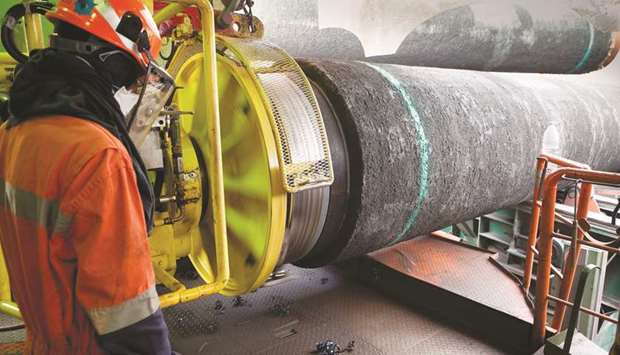EU moves ahead with Russia gas pipeline despite US opposition

AFP/Strasbourg, France
The European Union pushed ahead yesterday with an agreement that will allow Russia to continue to build a new gas pipeline to Europe, despite US warnings it posed a security risk.
The EU’s revised gas directive aims to establish common gas market rules for pipelines entering the bloc from a third country, with all the focus on Russia’s Nord Stream 2 project which will pipe gas to Germany.
In November 2017, the European Commission proposed amending the existing legislation in what was seen as a bid to put curbs on Nord Stream 2 launched by the Russian giant Gazprom.
Negotiators for the European Parliament and EU countries struck a provisional political agreement on Tuesday night on the rules that recognise Germany’s lead role in the pipeline while putting it under EU oversight.
The Nord Stream 2 pipeline will double the capacity to ship gas from Russia to Germany via the waters of Finland, Sweden and Denmark.
But the pipeline has faced opposition from many countries in eastern and central Europe, the United States and particularly Ukraine because it risks increasing Europe’s dependence on Russian natural gas.
Combined with the planned TurkStream pipeline across the Black Sea, Nord Stream 2 would mean Russia could bypass Ukraine in providing gas to Europe, robbing Moscow’s new foe of transit fees and a major strategic asset. The new regulations require all pipelines on European land and sea to meet with EU law, with exceptions only accorded under the strict supervision of Brussels.
Member states will have oversight of the project, but in light of concerns from eastern member countries, the European Commission, the 28-nation EU’s executive arm, will have the final say. The commission will also have the power to authorise a member state to open negotiations with a non-EU country in future deals.
“The new rules ensure that EU law will be applied to pipelines bringing gas to Europe and that everyone interested in selling gas to Europe must respect European energy law,” EU energy commissioner Miguel Arias Canete said yesterday. US Secretary of State Mike Pompeo said on Tuesday that the United States would do everything in its power to stop the gas pipeline to Europe as he joined Poland in warning of risks.
Pompeo said the pipeline from Russia, which began construction last year, “funnels money” to Russia in a way that ultimately hurts Europe.
The pipeline project got a new lease on life last week after France, which had demanded EU oversight, struck a compromise with Germany.
Rebecca Harms, who heads the Greens in the European Parliament, said: “With this accord, all the problems with Russia’s gas policy and all the problems on the gas market in eastern Europe are not settled.”
But Harms said: “But we have made a lot of progress.
We have ensured that Gazprom will have to play by European rules from now on.”
Her French colleague Michele Rivasi nevertheless worried the exemptions introduced by the member states “may reduce the impact of the legislation.”
The legislation must still be formally adopted by the European Parliament and the member countries.